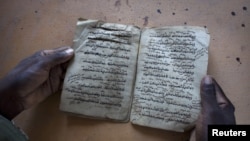Mayor Halley Ousmane of Mali's fabled city of Timbuktu says Islamist militants torched a library containing thousands of ancient Arab manuscripts, as they retreated from the city this week.
Experts are uncertain of the extent of damage at the Ahmed Baba Institute. But they fear many priceless documents have been destroyed.
The institute is one of several libraries in Timbuktu. It contains about 30,000 manuscripts, many of them collected from private family libraries throughout the country. Some of the fragile documents are bound by camel hide.
Some of the documents date back to the 13th century, a time when Timbuktu was a trading hub and center of Islamic scholarship.
In a VOA interview, Michael Covitt, chairman of Malian Manuscript Foundation, said the manuscripts cover a wide variety of topics.
“The manuscripts cover pretty much every science under the sun, from astronomy to astrology to numerology to mathematics to medicine to jurisprudence,” he said.
Covitt, whose foundation digitally preserves Malian manuscripts, says "wisdom of the ages" could potentially be lost as a result of the fire.
"It is the treasure not only the family but all the world. It’s probably the most important documents and legacy of intellectual pursuit discovered since the 20th century with the Dead Sea Scrolls,” he said.
Douglas Post Park, the Co-Director of the Saharan Archaeological Research Association, says the destruction of Timbuktu's manuscripts would amount to a "crime against culture."
The Ahmed Baba Institute opened a new building in 2009, with the help of funding from South Africa.
UNESCO, the U.N. cultural agency, lists Timbuktu as a World Heritage site for its ancient mosques and shrines.
Islamist group Ansar Dine destroyed a number of ancient mausoleums in Timbuktu during the months it ruled the city.
Some information for this report was provided by AP, AFP and Reuters.
Experts are uncertain of the extent of damage at the Ahmed Baba Institute. But they fear many priceless documents have been destroyed.
The institute is one of several libraries in Timbuktu. It contains about 30,000 manuscripts, many of them collected from private family libraries throughout the country. Some of the fragile documents are bound by camel hide.
Some of the documents date back to the 13th century, a time when Timbuktu was a trading hub and center of Islamic scholarship.
In a VOA interview, Michael Covitt, chairman of Malian Manuscript Foundation, said the manuscripts cover a wide variety of topics.
“The manuscripts cover pretty much every science under the sun, from astronomy to astrology to numerology to mathematics to medicine to jurisprudence,” he said.
Covitt, whose foundation digitally preserves Malian manuscripts, says "wisdom of the ages" could potentially be lost as a result of the fire.
"It is the treasure not only the family but all the world. It’s probably the most important documents and legacy of intellectual pursuit discovered since the 20th century with the Dead Sea Scrolls,” he said.
Douglas Post Park, the Co-Director of the Saharan Archaeological Research Association, says the destruction of Timbuktu's manuscripts would amount to a "crime against culture."
The Ahmed Baba Institute opened a new building in 2009, with the help of funding from South Africa.
UNESCO, the U.N. cultural agency, lists Timbuktu as a World Heritage site for its ancient mosques and shrines.
Islamist group Ansar Dine destroyed a number of ancient mausoleums in Timbuktu during the months it ruled the city.
Some information for this report was provided by AP, AFP and Reuters.






